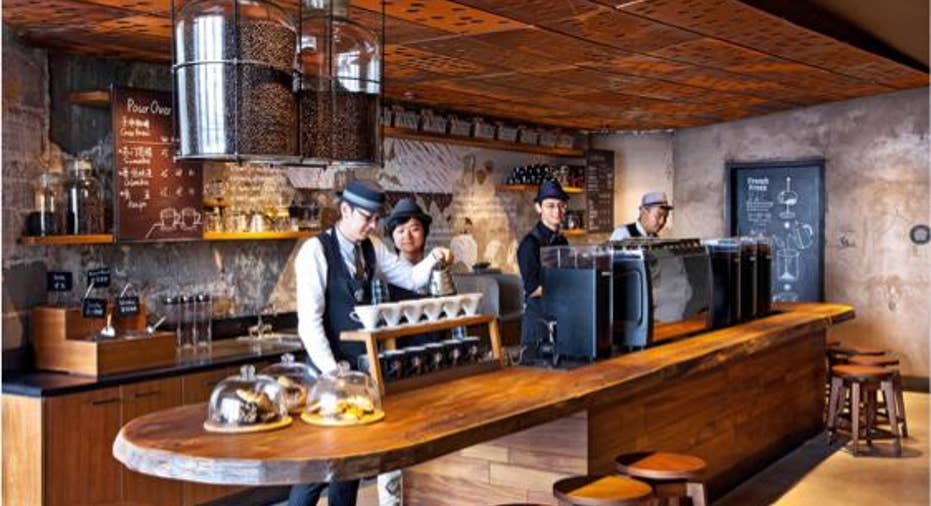What China's Slowing Economic Growth Means for Starbucks

Starbucks has placed a big bet on the Chinese market.
While other companies manufacture in China or sell their products there, the coffee chain has a large and fast-growing physical presence in the country. In fact, CEO Howard Schultz said in a January 2016 interview withThe Wall Street Journal that the chain, which already has 2,000 stores in the market, would add another 500 each year for the next five years.
That would make China, which is already the company's second largest market -- bigger than all of Europe for the coffee chain, by store count and revenue. It would still be only about a third the size of the chain's United States operations, but it's clear Schultz sees the country as pivotal for driving growth.
Currently, Starbucks has made a big bet on China's growth, but more than doubling that over the next five years exposes the company to any potential slowdowns in the market. And, because the coffee chain sells a premium product, it may be more exposed than other American companies like Yum! Brands, which has more locations (7,176 as of its Q4 earnings report).
Starbucks plans to have over 4,500 stores in China. Image source: Starbucks.
Starbucks is all inSchultz has been bullish about the Chinese market, and his remarks during the company's 2016 annual shareholders's meeting show the depth of his commitment.
"We've been in China now for 17 years. Many people think it's an overnight success. The truth of the matter is that we actually lost money in China for a number of consecutive years," he said according to a Seeking Alpha transcript of the event. "During that time, there were a lot of cynics, a lot of doubters that perhaps we were not going to make it in China and today I am so proud to tell you that we are sitting in China with 2,000 Starbucks stores in 100 cities, and China has become one of the most important and successful businesses around the world for Starbucks Coffee Company."
How good are the numbers?Schultz has good reason to be excited about the company's prospects in China, and it's fair to say that any economic downturn has not hurt its performance. In Q2 2016, Starbucks reported net revenue of $667.9 million for its China/Asia Pacific segment. That's 14% growth over the same period last year. That was driven largely by the chain opening 884 new stores during the previous 12 months.
Comparable-store sales were good as well, growing 3% over the previous year. The company also saw its operating margin expand by 20 basis points to 19.1% "primarily due to sales leverage and higher income from our joint venture operations," according to the earnings release. That expansion was "partially offset by the impact of foreign currency and increased store operating expenses related to higher compensation and benefits," the company added.
In comparison, Yum! reported 2% same-store sales growth for its China division in Q4 and a 4% decline for the full year.
Schultz is not worriedWhile a full-scale economic collapse in China would obviously hurt Starbucks, Yum!, or any other company operating within the country's borders, an ongoing slowdown may not. That's because in tough economic times, people deny themselves big-ticket items. They give up vacations and stop buying jewelry, expensive clothes, and other non-necessities. Starbucks, however, sells affordable luxuries. Its coffee may be expensive compared to making it yourself, but it's a reasonable treat for someone struggling to make ends meet, putting off larger indulgences.
Schultz does not seem worried at all, and during a January trip to China, he said he expects it to become Starbucks' largest market,The Wall Street Journalreported. He also downplayed any fears of the slowing economy.
"We have confidence in the future of the Chinese economy, despite all the rhetoric, noise and issues," said Schultz, who is visiting China this week. "People are looking for reasons not to believe. I'm on the ground and I see firsthand. I am bullish."
Barring a full-on economic disaster in the company, it seems likely Schultz is right. His company has significant exposure, but its product line is well-suited to weather slowing economic growth by selling Chinese consumers lattes to make them feel optimistic during downturns and celebratory espresso drinks when things improve.
The article What China's Slowing Economic Growth Means for Starbucks originally appeared on Fool.com.
Daniel Kline has no position in any stocks mentioned. He hopes to someday tour Starbucks locations around the world. The Motley Fool owns shares of and recommends Starbucks. Try any of our Foolish newsletter services free for 30 days. We Fools may not all hold the same opinions, but we all believe considering a diverse range of insights makes us better investors. The Motley Fool has a disclosure policy.
Copyright 1995 - 2016 The Motley Fool, LLC. All rights reserved. The Motley Fool has a disclosure policy.



















